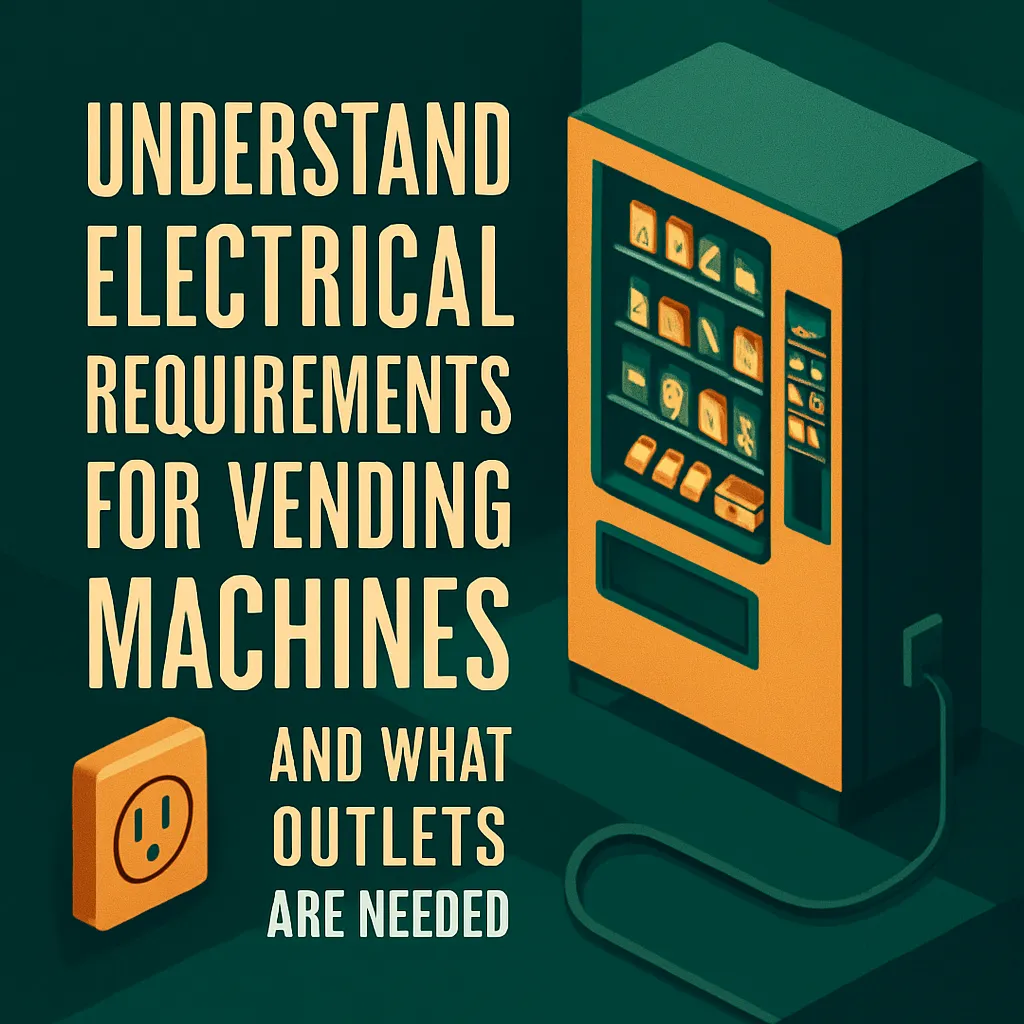Do Vending Machines Require Special Outlets?
Understand electrical requirements for vending machines and what outlets are needed.
Back to Vending FAQs ResourcesUnderstand electrical requirements for vending machines and what outlets are needed.
Back to Vending FAQs ResourcesMost vending machines operate efficiently with standard electrical connections, but specialized units may require specific power outlets for optimal performance and safety.
![]() Standard snack and drink machines often use a typical 120V outlet
Standard snack and drink machines often use a typical 120V outlet
![]() Hot beverage or frozen food machines may need higher voltage
Hot beverage or frozen food machines may need higher voltage
![]() A dedicated circuit prevents overloading and ensures reliable operation
A dedicated circuit prevents overloading and ensures reliable operation

When considering adding vending machines to your location, one of the most common questions revolves around their power requirements. Understanding whether vending machines require special outlets is crucial for proper installation and safe operation. The good news is that most standard snack and cold drink vending machines operate on conventional electrical outlets, much like many everyday appliances.
For a typical soda or snack machine, you will most likely need a standard 120-volt, 15-amp, three-pronged grounded outlet. This is the same type of wall outlet you’d find in most homes and offices. However, the key differentiator is that this outlet should ideally be on a dedicated circuit. A dedicated circuit ensures that the vending machine has its own power supply and doesn't compete with other devices, preventing tripped breakers and ensuring consistent operation. For more insights on general setup, read our guide on how long does it take to install a vending machine.
While many machines are straightforward, some specialized vending units do require more robust electrical setups. Machines that dispense hot food, fresh meals, or offer elaborate coffee services often draw more power. These units might need a 208-volt or 240-volt circuit, which is common for larger commercial appliances. Similarly, certain high-capacity freezer vending machines could also fall into this category. Always check the manufacturer's specifications or consult your vending provider to confirm the specific electrical needs for these types of machines. It’s also wise to consider the overall connectivity; for instance, modern machines may also be equipped with telemetry, so understanding Do Vending Machines Need WiFi or Power? is also important.
Regardless of the voltage, a dedicated circuit is a best practice for almost all vending machine installations. Vending machines, particularly those with refrigeration or heating elements, can experience power surges or draw significant current. If they share a circuit with other high-draw devices, it can lead to:
If your location does not have a dedicated circuit or the specific voltage required, it's best to consult a licensed electrician before installation. They can assess your electrical panel and install the correct wiring and outlets. Understanding the requirements upfront will save time and prevent operational issues down the line. Find out more about machine sizing and placement here: Vending Machine Size and Space Requirements.
Most standard vending machines for snacks and cold drinks only require a dedicated 120-volt, 15-amp grounded outlet, similar to a typical household appliance.
A standard three-pronged 120-volt, 15-amp outlet is usually sufficient. It's crucial for the outlet to be dedicated, meaning no other appliances share the circuit.
Yes, machines that heat food, dispense hot beverages, or have more complex refrigeration systems often require higher voltage outlets, such as 208-volt or 240-volt circuits.
A dedicated circuit provides power to only one appliance or machine. This prevents overloading the circuit, which could cause breakers to trip and the machine to shut down.
It is generally not recommended, especially for refrigerated machines. Sharing an outlet can lead to power fluctuations, tripped breakers, and potential damage to the machine or other devices.
Always consult the machine's manufacturer specifications or the vendor providing the machine. They will outline the precise voltage and amperage needed.
You may need to hire a licensed electrician to install the appropriate dedicated circuit and outlet. Discuss options with your vending provider.
Some compact or non-refrigerated bulk vending machines might have minimal power requirements, but most modern amenity machines do need a standard dedicated outlet.
AI vending coolers (smart fridges) typically still require a dedicated 120-volt, 15-amp grounded outlet. They integrate refrigeration and power for their internal technology.
While not always explicitly required for all machines, a Ground Fault Circuit Interrupter (GFCI) outlet is highly recommended, especially in damp environments or near water sources, for enhanced safety.